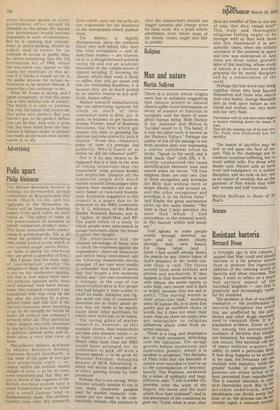Religion
Man and nature •
Martin Sullivan
There is a notion whose origins seem lost in antiquity suggesting that natural powers or natural objects suffer some interruption or decay of essence or function in sympathy with the death of some gifted human being. Both Shelley in his 'Adonais' and Milton in 'Lycidas' resort to it. The belief, if it may be called such, is known as the 'Pathetic Fallacy.' Perhaps the author of Job (if the passage is not from another pen) was expressing a similar sentiment when he wrote, "Speak to the earth and it shall teach thee" (Job XII, v 8.'
Goethe emphasised the same identification between man and nature when he wrote, "Of true religions there are only two. One of them recognises and worships the Holy that without form or shape dwells in and around us, and the other recognises and worships it in its fairest form."
And Kepler the great astronomer picks up the same theme: "My wish is that I may perceive the same God whom I find everywhere in the external world, in like manner within and inside me."
God speaks to some people mainly through external na ture and to others chiefly through their own hearts. For these latter, (and I think I find myself among them), the search for any clearer token of God's presence in the world out side them is vain. The forces around them seem soulless and pitiless and mechanical. If they happen to find themselves in tune with nature, she seems merely to echo their own moods and is dark or bright, because they are sad or merry. "The moving waters at their priest-like task," washing away all human ills, is to them fine poetry and an excellent choice of words, but it does not enter their souls. And yet there are many who are susceptible to religious influences which come from external sources.
There is a long and impressive line of such witnesses, stretching over the centuries. The savage grovels before mysterious and malevolent powers, whom it is prudent to propitiate. The disciples of Plato hold that the beauties of nature were intended to lead us up to the contemplation of heavenly beauty. The Psalmist, awakened by a sense of sublimity and mag nificence, says, "I will consider thy heavens, even the work of thy fingers, the moon and the stars which thou hast ordained"; and in this awareness of the numinous he goes on: "Lord, what is man, that thou art mindful of him or the son of man, that thou visited him?" This truly and thoroughly religious feeling ought to be stronger with us than with those who first experienced it in prescientific times, when the infinite extension of the universe in space and time was undreamed of. And there are those today, grateful heirs of this teaching, whose study of nature is a reverent worship prepared for by moral discipline and by a renunciation of the world.
Perhaps the last word may bring together those who look beyond themselves and those who search their own hearts. George Meredith bids us look, upon nature as our friend and mother, our very bone and our very flesh.
The lesson writ in red since time began A hunter hunting down the beast in man: That till the chasing out of its last vice, The flesh was fashioned but for sacrifice.
The lesson of sacrifice may be writ in red upon the face of nature. This is the challenge not to condone vicarious suffering, but to crush selfish wills. For those who deeply care, Nature calls us back from self-indulgence to, a nobler discipline, and we look on her, not as an object of worship, but as the garment of Him whom that robe half reveals and half conceals.
Martin Sullivan is Dean of St Paul's


































 Previous page
Previous page